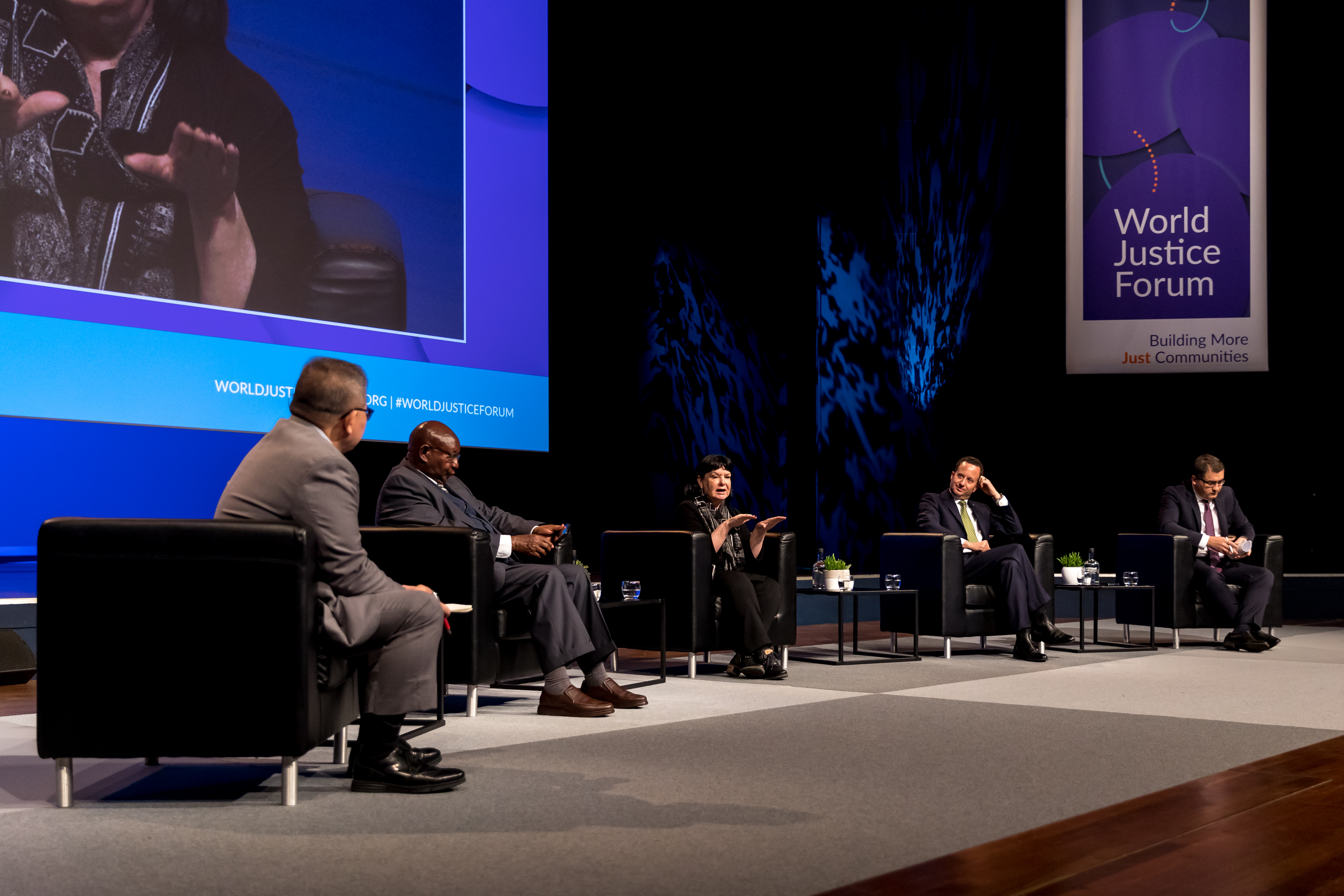

The World Justice Forum 2022: Building More Just Communities gathered over 1,200 people from 116 countries in The Hague, Netherlands and online for a week of learning, collaboration, and agenda-setting for the international rule of law and justice community. From May 30 to June 3, the Forum hosted participants from across civil society, government agencies, the private sector, inter-governmental organizations, the donor community, and media.
The World Justice Project (WJP) and co-producing partners focused the Forum agenda on three intersecting themes critical to addressing the root causes of injustices exacerbated during the pandemic: Anti-Corruption and Open Government, Access to Justice, and Equal Rights and Non-Discrimination. The program featured dynamic plenary discussions, interactive working sessions, the Justice Expo exhibition hall, off-site visits to explore local initiatives in The Hague, presentation of the World Justice Challenge finalists and winners, and cultural activities including music, dance and cartoonists.
Following a special welcoming reception on May 30, the action-oriented agenda began on May 31 with a focus on diagnosing key challenges and priorities across the Forum’s three themes.
See Day 1 highlights with speakers including WJP Chairman of the Board William Hubbard, Ugandan justice official Edgar Kuhimbisa, Hewlett Packard Enterprise’s Pam Wood, Sierra Leone Justice Minister Mohamed-Lamin Tarawalley, UN High Commissioner for Human Rights Michelle Bachelet, and European Commission Vice President Věra Jourová:
June 1 was dedicated to highlighting promising approaches for impact and change, with a focus on effective rule of law projects presented by 30 World Justice Challenge finalists from 27 countries.
See Day 2 highlights featuring WJP Board Member and Rappler journalist John Nery, former Polish Prime Minister Hanna Suchocka, Uzbekistan Justice Minister Ruslanbek Davletov, Kenyan Justice official Paul Kimalu, and International Trade Union General Secretary Sharan Burrow:
June 2 featured recommendations and commitments to take action on the key issues identified and highlighted during the Forum. And on June 3, the Forum hosted partner side events and workshops on a diverse array of rule of law topics.
See Day 3 highlights including from the World Justice Challenge award ceremony and remarks from WJP Executive Director Elizabeth Andersen, former Irish President and Chair of the Elders Mary Robinson, Ruth Bader Ginsburg Legacy Keynote speaker Sherrilyn Ifill of the NAACP Legal Defense Fund, CIVICUS Secretary General Lysa John, and WJP Co-founder and CEO William Neukom:
For the first time ever, this year’s Forum was held in a hybrid format to allow interactive participation for both in-person and online attendees around the world. To support broad and diverse engagement, Arabic, French, Russian, and Spanish simultaneous interpretation was offered for all key program components, in addition to the Forum’s primary language of English.
At the close of the Forum WJP Executive Director Elizabeth Andersen shared the Forum’s final statement, which was drafted collaboratively with partners to capture key insights and priorities for strengthening the rule of law that emerged from the week’s activities. This included a commitment to rescue the global rule of law from its current downward trajectory, a call for re-doubled investment and political will towards a people-centered justice agenda, and a confirmation in our shared conviction that the 2030 Agenda for sustainable development, and particularly the fulfillment of SDG 16, remains the best path forward for all countries.
These commitments have already been bolstered by numerous outcomes that emerged from the Forum, which served as a critical platform to establish and advance rule of law priorities.
Initiatives and outcomes that emerged from the 2022 World Justice Forum include:
- The adoption of the Justice Action Coalition’s Justice Appeal 2023, which calls on all countries to pivot to people-centered justice
- The launch of UNDP’s Justice Futures CoLab, a new initiative to generate evidence, provide training, and build partnerships on justice and human rights challenges
- Strengthened commitment from key political and academic leaders on the establishment of an International Anti-Corruption Court
- The release of the International Legal Assistance Consortium’s “Judges as Peacebuilders” discussion papers
- The launch of the Pathfinders Young Justice Leaders’ workplan at their inaugural intergenerational dialogue.
Many more outcomes continue to develop and will be featured in a final report coming in September.






